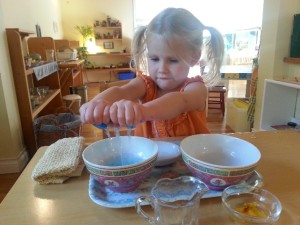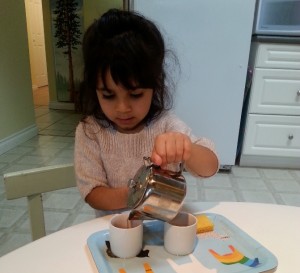 The exercises in Practical Life are the very heart of Montessori education. As young children wash tables, pour liquids, polish silver, sweep and dust, they are developing calmness, order, concentration, coordination, as well as expanding their fine motor skills. At the same time, through the process of learning to meet their own needs, learning to take care of the classroom environment, and through the experience of helping others, children in Montessori programs begin to develop independence, self-confidence, and self-respect.
The exercises in Practical Life are the very heart of Montessori education. As young children wash tables, pour liquids, polish silver, sweep and dust, they are developing calmness, order, concentration, coordination, as well as expanding their fine motor skills. At the same time, through the process of learning to meet their own needs, learning to take care of the classroom environment, and through the experience of helping others, children in Montessori programs begin to develop independence, self-confidence, and self-respect.
 Having watched adults in their environment performing these activities children want to carry them out too. In the Montessori prepared environment, using tools of the right proportions, children can efficiently and effectively perform these tasks. All exercises must be real and not make believe, and they must always be available for the child to use. Tools not toys. The child is introduced to very simple activities at first, such as how to carry a chair, to roll a work mat, to wash their hands etc., only gradually becoming more complex. The activities must reflect the child’s interest and teach her new life skills.
Having watched adults in their environment performing these activities children want to carry them out too. In the Montessori prepared environment, using tools of the right proportions, children can efficiently and effectively perform these tasks. All exercises must be real and not make believe, and they must always be available for the child to use. Tools not toys. The child is introduced to very simple activities at first, such as how to carry a chair, to roll a work mat, to wash their hands etc., only gradually becoming more complex. The activities must reflect the child’s interest and teach her new life skills.
Adults perform these activities to improve the environment, a child does them to improve herself in response to some inner need, it is a process of inner development. Adults do the task once, the quickest and most efficient way, a child will repeat them over and over again, with no short cuts. She is interested in the process, rather than the end result, and in the acquisition of the skill. The child needs to complete the whole activity from start to finish. The freedom to repeat exercises at will, to practice, leads the child to success.
By the acquisition of new skills the child improves hand-eye co-ordination and dexterity and develops spatial awareness. She refines gross and fine motor skills, mental development is aided by satisfying her inner need to grow in self-knowledge and confidence, whilst her self-image improves. The need for order is also satisfied and the child learns about the enjoyment one gets from work completed. His concentration is developed and ultimately through his independence he will gain mastery of the self.

